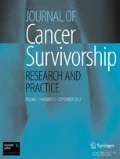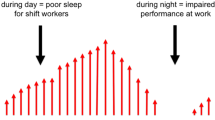Abstract
Purpose
The purpose of this research was to develop a brief, reliable self-report measure of work-related cognitive limitations in occupationally active breast cancer survivors.
Methods
A pooled dataset of working breast cancer survivors (n = 228) completed a self-report measure of work-related cognitive limitations, the Cognitive Symptom Checklist-Work-59 (CSC-W59). A cross-validation technique was employed such that the pooled participants were randomized into two separate groups in order to conduct exploratory factor analysis (EFA) of the CSC-W59 with one group (n = 114) and confirm the results with the second group (n = 114).
Results
EFA of the CSC-W59 identified 21 items with a consistent factor loading of .4 or higher on three separate subscales (Working Memory, Executive Function, and Task Completion). These findings resulted in a 21-item, self-report measure referred to as the Cognitive Symptom Checklist-Work-21 (CSC-W21). The CSC-W21 demonstrated internal reliability (α = .88). Construct validity of the CSC-W21 is supported by significant positive correlations with cancer stage, job stress, and affective state.
Conclusions
Brief, valid, internally reliable self-report measures such as the CSC-W21 may be used to quickly assess work-related cognitive problems for breast cancer survivors at work.
Implications for Cancer Survivors
A brief measure is available to help identify tasks that present problems for breast cancer survivors who are at work. This measure can be used to facilitate research to improve the understanding and mitigation of cognitive challenges in breast cancer survivors in the work setting.
Similar content being viewed by others
References
SEER. SEER Cancer Statistics Review, 1975–2009 (Vintage 2009 Populations). Howlader, N., Noone, A. M., Krapcho, M., Neyman, N., Aminou, R., Altekruse, S. F., et al. (eds.). Bethesda, MD: National Cancer Institute; based on November 2011 SEER data submission, posted to the SEER website, 2012. Available from http://seer.cancer.gov/csr/1975_2009_pops09/. 2012.
Boykoff N, Moieni M, Subramanian SK. Confronting chemobrain: an in-depth look at survivors' reports of impact on work, social networks, and health care response. J Cancer Surviv. 2009;3(4):223–32.
Downie FP, Mar Fan HG, Houede-Tchen N, Yi Q, Tannock IF. Cognitive function, fatigue, and menopausal symptoms in breast cancer patients receiving adjuvant chemotherapy: evaluation with patient interview after formal assessment. Psychooncology. 2006;15(10):921–30.
Janelsins MC, Kohli S, Mohile SG, Usuki K, Ahles TA, Morrow GR. An update on cancer- and chemotherapy-related cognitive dysfunction: current status. Semin Oncol. 2011;38(3):431–8.
Shilling V, Jenkins V, Morris R, Deutsch G, Bloomfield D. The effects of adjuvant chemotherapy on cognition in women with breast cancer–preliminary results of an observational longitudinal study. Breast. 2005;14(2):142–50.
Breckenridge LM, Bruns GL, Todd BL, Feuerstein M. Cognitive limitations associated with tamoxifen and aromatase inhibitors in employed breast cancer survivors. Psychooncology. 2012;21(1):43–53.
Wefel JS, Lenzi R, Theriault RL, Davis RN, Meyers CA. The cognitive sequelae of standard-dose adjuvant chemotherapy in women with breast carcinoma: results of a prospective, randomized, longitudinal trial. Cancer. 2004;100(11):2292–9.
Von Ah D, Habermann B, Carpenter JS, Schneider BL. Impact of perceived cognitive impairment in breast cancer survivors. Eur J Oncol Nurs. 2012:1–6.
Munir F, Burrows J, Yarker J, Kalawsky K, Bains M. Women's perceptions of chemotherapy-induced cognitive side affects on work ability: a focus group study. J Clin Nurs. 2010;19(9–10):1362–70.
Wefel JS, Saleeba AK, Buzdar AU, Meyers CA. Acute and late onset cognitive dysfunction associated with chemotherapy in women with breast cancer. Cancer. 2010;116(14):3348–56.
Bender CM, Sereika SM, Berga SL, Vogel VG, Brufsky AM, Paraska KK, et al. Cognitive impairment associated with adjuvant therapy in breast cancer. Psychooncology. 2006;15(5):422–30.
Quesnel C, Savard J, Ivers H. Cognitive impairments associated with breast cancer treatments: results from a longitudinal study. Breast Cancer Res Treat. 2009;116(1):113–23.
Jenkins V, Shilling V, Deutsch G, Bloomfield D, Morris R, Allan S, et al. A 3-year prospective study of the effects of adjuvant treatments on cognition in women with early stage breast cancer. Br J Cancer. 2006;94(6):828–34.
Calvio L, Peugeot M, Bruns GL, Todd BL, Feuerstein M. Measures of cognitive function and work in occupationally active breast cancer survivors. J Occup Environ Med. 2010;52(2):219–27.
Hansen JA, Feuerstein M, Calvio LC, Olsen CH. Breast cancer survivors at work. J Occup Environ Med. 2008;50(7):777–84.
Hutchinson AD, Hosking JR, Kichenadasse G, Mattiske JK, Wilson C. Objective and subjective cognitive impairment following chemotherapy for cancer: A systematic review. Cancer Treat Rev. 2012;38(7):926–34.
Pullens MJ, De Vries J, Roukema JA. Subjective cognitive dysfunction in breast cancer patients: a systematic review. Psychooncology. 2010;19(11):1127–38.
Cheung YT, Tan EH, Chan A. An evaluation on the neuropsychological tests used in the assessment of postchemotherapy cognitive changes in breast cancer survivors. Support Care Cancer. 2012;20(7):1361–75.
Glisky EL. Changes in cognitive function in human aging. In: Riddle DR, editor. Brain Aging: Models, Methods, and Mechanisms. Boca Raton (FL): CRC Press; 2007. Chapter 1.
Wallace JC, Chen G. Development and validation of a work-specific measure of cognitive failure: implications for occupational safety. J Occup Organ Psychol. 2005;78:615–32.
Wagner L, Sweet J, Butt Z, Lai J, Cella D. Measuring patient self-reported cognitive function: development of the Functional Assessment of Cancer Therapy-Cognitive Function Instrument. J Support Oncol. 2009;7:W32–9.
Aaronson NK, Ahmedzai S, Bergman B, Bullinger M, Cull A, Duez NJ, et al. The European Organization for Research and Treatment of Cancer QLQ-C30: a quality-of-life instrument for use in international clinical trials in oncology. J Natl Cancer Inst. 1993;85(5):365–76.
O'Hara C, Harrell M, Bellingrath E, Lisicia K. Cognitive symptom checklists: clinician's guide. Lutz (FL): Psychological Assessment Resources, Inc; 1993.
Feuerstein M, Hansen JA, Calvio LC, Johnson L, Ronquillo JG. Work productivity in brain tumor survivors. J Occup Environ Med. 2007;49(7):803–11.
Zigmond AS, Snaith RP. The hospital anxiety and depression scale. Acta Psychiatr Scand. 1983;67(6):361–70.
Alexander S, Palmer C, Stone PC. Evaluation of screening instruments for depression and anxiety in breast cancer survivors. Breast Cancer Res Treat. 2010;122(2):573–8.
Lerner D, Amick BC III, Rogers WH, Malspeis S, Bungay K, Cynn D. The Work Limitations Questionnaire. Med Care. 2001;39(1):72–85.
Wagner L, Cella D, Doninger N. Chemotherapy-related cognitive deficits: a qualitative examination of patients and providers. Annals of Behavioral Medicine. 2003;25(S56).
Jacobs SR, Jacobsen PB, Booth-Jones M, Wagner LI, Anasetti C. Evaluation of the functional assessment of cancer therapy cognitive scale with hematopoietic stem cell transplant patients. J Pain Symptom Manag. 2007;33(1):13–23.
Preacher KJ, Zhang G, Kim C, Mels G. Choosing the optimal number of factors in exploratory factor analysis: a model selection perspective. Multivariate Behavioral Research. in press.
Costello AB, Osborne JW. Best practices in exploratory factor analysis: four recommendations for getting the most from your analysis. Pract Assess Res Eval. 2005;10(7):1–9.
Kaiser H. A second generation little jiffy. Psychometrika. 1970;35:401–15.
Kaiser H. An index of factorial simplicity. Psychometrika. 1974;39:31–6.
Garson GD. Factor analysis (Statistical Associates "Blue Book" series). Kindle Edition ed: Statistical Associates Publishers; 2012.
Tabachnick BG, Fidell LS. Using multivariate statistics. 5th ed. Boston: Pearson/Allyn & Bacon; 2007.
Bartlett MS. A note on the multiplying factors for various chi square approximations. J R Stat Soc. 1954;16 (Series B):296–8.
Biglia N, Bounous VE, Malabaila A, Palmisano D, Torta DM, D'Alonzo M, et al. Objective and self-reported cognitive dysfunction in breast cancer women treated with chemotherapy: a prospective study. Eur J Cancer Care (Engl). 2012;21(4):485–92.
Shilling V, Jenkins V. Self-reported cognitive problems in women receiving adjuvant therapy for breast cancer. Eur J Oncol Nurs. 2007;11(1):6–15.
Munir F, Kalawsky K, Lawrence C, Yarker J, Haslam C, Ahmed S. Cognitive intervention for breast cancer patients undergoing adjuvant chemotherapy: a needs analysis. Cancer Nurs. 2011;34(5):385–92.
Todd BL, Feuerstein EL, Feuerstein M. When breast cancer survivors report cognitive problems at work. Int J Psychiatry Med. 2011;42(3):279–94.
Gijsen CP, Dijkstra JB, van Boxtel MP. Recurrent pain is associated with decreased selective attention in a population-based sample. Pain. 2011;152(1):188–93.
Wefel JS, Schagen SB. Chemotherapy-related cognitive dysfunction. Curr Neurol Neurosci Rep. 2012;12(3):267–75.
Dragun AE, Huang B, Gupta S, Crew JB, Tucker TC. One decade later: trends and disparities in the application of post-mastectomy radiotherapy since the release of the American Society of Clinical Oncology clinical practice guidelines. Int J Radiat Oncol Biol Phys. 2012;83(5):e591–6.
Brewer GA, Ball BH, Knight JB, Dewitt MR, Marsh RL. Divided attention interferes with fulfilling activity-based intentions. Acta Psychol. 2011;138(1):100–5.
Fardell JE, Vardy J, Johnston IN, Winocur G. Chemotherapy and cognitive impairment: treatment options. Clin Pharmacol Ther. 2011;90(3):366–76.
Ferguson RJ, Ahles TA, Saykin AJ, McDonald BC, Furstenberg CT, Cole BF, et al. Cognitive-behavioral management of chemotherapy-related cognitive change. Psychooncology. 2007;16(8):772–7.
Kohli S, Fisher SG, Tra Y, Adams MJ, Mapstone ME, Wesnes KA, et al. The effect of modafinil on cognitive function in breast cancer survivors. Cancer. 2009;115(12):2605–16.
Warner ET, Tamimi RM, Hughes ME, Ottesen RA, Wong YN, Edge SB, et al. Time to diagnosis and breast cancer stage by race/ethnicity. Breast Cancer Res Treat. 2012;136(3):813–21.
de Winter JCF, Dodou D, Wieringa PA. Exploratory factor analysis with small sample sizes. Multivar Behav Res. 2009;44:147–81.
Feuerstein M, Todd BL, Moskowitz MC, Bruns GL, Stoler MR, Nassif T, et al. Work in cancer survivors: a model for practice and research. J Cancer Surviv. 2010;4(4):415–37.
Financial disclosures
There are no financial disclosures from any authors.
Funding Sources
This research was supported by the Cancer Survivorship Fund, Henry M. Jackson Foundation, and the Uniformed Services University of the Health Sciences.
Author information
Authors and Affiliations
Corresponding author
Additional information
The opinions and assertions contained herein are the private views of the authors and are not to be construed as being official or as reflecting the views of the Uniformed Services University of the Health Sciences or the Department of Defense.
Appendix A: Cognitive Symptom Checklist-Work-21 item (CSC-W21)
Appendix A: Cognitive Symptom Checklist-Work-21 item (CSC-W21)
Cognitive Symptom Checklist-Work-21 item (CSC-W21)
Please read each of the following items below. They describe problems that you may or may not experience at work.
Item: | Yes | No |
1. I have difficulty remembering what I intended to write | ||
2. I have difficulty remembering my train of thought as I am speaking | ||
3. I have difficulty remembering the content of telephone conversations | ||
4. I have difficulty remembering the content of conversations and/or meetings | ||
5. I have difficulty remembering a word I wish to say | ||
6. I have difficulty remembering the name of a familiar object or person | ||
7. I have difficulty remembering information that is “on the tip of my tongue” | ||
8. I have difficulty remembering things someone has asked me to do | ||
9. I have difficulty understanding a system | ||
10. I have difficulty understanding how a task fits into a plan or system | ||
11. I have difficulty knowing where to look for information to solve a problem | ||
12. I have difficulty understanding systems and models | ||
13. I have difficulty figuring out how a decision was reached | ||
14. I have difficulty using new information to re-evaluate what I know | ||
15. I have difficulty considering all aspects of what I hear and see instead of focusing on only one part | ||
16. I have difficulty understanding what a problem is when it occurs and clearly stating what the problem is | ||
17. I have difficulty following the flow of events | ||
18. I have difficulty understanding graphs and flowcharts | ||
19. I have difficulty completing all steps of a task or activity | ||
20. I have difficulty staying with a task until completion | ||
21. I have difficulty putting steps in order such that the most important steps are done first |
Rights and permissions
About this article
Cite this article
Ottati, A., Feuerstein, M. Brief self-report measure of work-related cognitive limitations in breast cancer survivors. J Cancer Surviv 7, 262–273 (2013). https://doi.org/10.1007/s11764-013-0275-9
Received:
Accepted:
Published:
Issue Date:
DOI: https://doi.org/10.1007/s11764-013-0275-9




